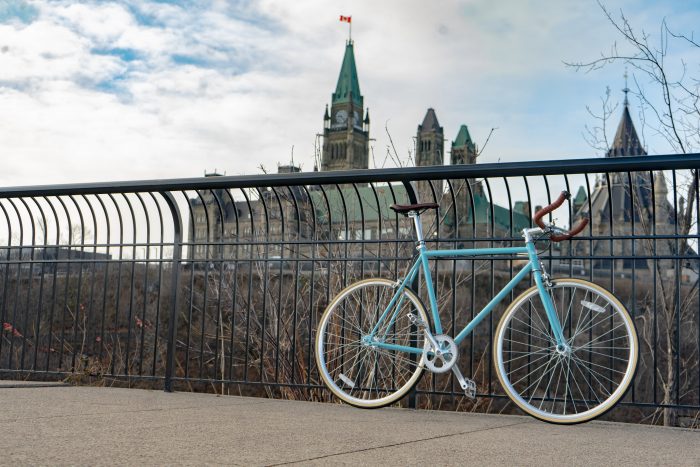Carleton University, situated outside the downtown core of Ottawa, is a popular destination campus for visitors coming from both the city and nearby communities. Thanks to an O-Train stop located at the heart of the campus and efficient bus links, more than 70% of visitors travel to the campus using public transport or active transportation methods.
Carleton is committed to reducing single-occupancy travel and promoting sustainable travel modes.
Campus Bike Storage
Cycling is an excellent way for students and staff to commute sustainably while also reaping the many benefits of cycling. The campus has several open bicycle racks in convenient locations that can be used free of charge.
Parking Services also sells permits for secure bicycle storage compounds at various locations (see list below). It costs only $90 per year to register and use these facilities, and you can find more information about the storage compounds and registration process here.
Secure Bicycle Compound Locations
Athletics – beneath the pool deck
Teraanga Commons
Dunton Tower – next to Azrieli Pavilion on Library Road
There is also a bike repair station situated on the north side of the Architecture Building, and includes all tools necessary for basic bike maintenance needs.
To help prevent bike theft and aid in recovery, Ottawa Police Services provides a bike registry, in partner with 529 Garage, where individuals can register their bikes. This registry can assist in tracking down a stolen bike if such an unfortunate event occurs. More information and how to register can be found here.
Popular Cycling Routes Nearby
Need some help with route planning to get to/from campus? Check out some of these mapping tools or use the map below to check out some general routes you can take to get to campus by bike!
Looking to continue biking year-round? Check out EnviroCentre’s Guide to Winter Cycling for some useful tips and tools to stay safe in the winter! We also have a video of a previously held workshop that discusses some topics found in the guide.
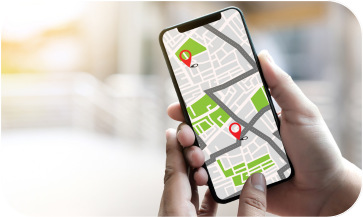 Here are some of our favourite maps:
Here are some of our favourite maps:
Let's Bike Month
Let’s Bike Month takes place in June and encourages the Carleton community to consider changing their transportation habits and try cycling to work.
The program includes a team challenge where participants log their mileage to win prizes, a workshop on urban cycling that provides tips for biking to work, and free bike tune-ups. Stay tuned to our socials and the Let’s Bike Month webpage for more information about this year’s activities!
Did you know that Procurement Services also offers a Bicycle Purchase Loan Program for Carleton employees?
Learn more here.
E-Scooters
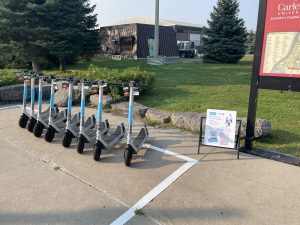 Carleton University has teamed up with Bird Canada to introduce e-scooters to our campus and evaluate their potential as a mode of transportation to and from our campus. Please note that Bird e-scooters are not allowed to be ridden on the main campus, but they can be ridden to the edge of the campus and parked at two designated parking sites known as ‘nests’ for convenience. E-scooters offer a new and sustainable mode of transportation that can help reduce single-rider automobile use and promote healthy lifestyles.
Carleton University has teamed up with Bird Canada to introduce e-scooters to our campus and evaluate their potential as a mode of transportation to and from our campus. Please note that Bird e-scooters are not allowed to be ridden on the main campus, but they can be ridden to the edge of the campus and parked at two designated parking sites known as ‘nests’ for convenience. E-scooters offer a new and sustainable mode of transportation that can help reduce single-rider automobile use and promote healthy lifestyles.
You can find more information, locations of the ‘nests,’ and policy guidelines regarding the use of e-scooters on campus here.
Walking
 Walking is the most fundamental mode of transportation, with millions of people worldwide using it to commute to work, school, or any other destination they need to reach. The City of Ottawa and the National Capital Commission (NCC) have provided excellent infrastructure for pedestrians traveling along city streets and the canal to reach Carleton University. Once on campus, there is a well-maintained, designated ‘Safe Path’ walkway to guide you across the campus. Individuals living within a 30-minute walking distance of the campus are encouraged to consider walking, as it is not only good for the environment but also great for your health – get active!
Walking is the most fundamental mode of transportation, with millions of people worldwide using it to commute to work, school, or any other destination they need to reach. The City of Ottawa and the National Capital Commission (NCC) have provided excellent infrastructure for pedestrians traveling along city streets and the canal to reach Carleton University. Once on campus, there is a well-maintained, designated ‘Safe Path’ walkway to guide you across the campus. Individuals living within a 30-minute walking distance of the campus are encouraged to consider walking, as it is not only good for the environment but also great for your health – get active!
OC Transpo and O-Train
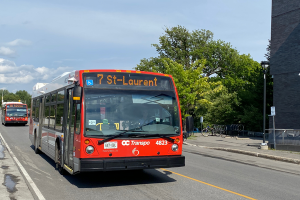 There are various bus routes available that come to the Carleton University campus. To plan your trip to or from campus, please refer to the OC Transpo website for fare information, transit schedules, and route maps. Full-time students also receive a U-Pass, which will let them ride on all OC Transpo and STO routes during their full-time school terms.
There are various bus routes available that come to the Carleton University campus. To plan your trip to or from campus, please refer to the OC Transpo website for fare information, transit schedules, and route maps. Full-time students also receive a U-Pass, which will let them ride on all OC Transpo and STO routes during their full-time school terms.
The City of Ottawa is currently working on the expansion of the Light Rail Transit (LRT) network, which includes the O-Train stop on campus. The project is expected to be completed by late 2023. Check the OC Transpo website for updates on the project and any resulting changes in transit routes.
Public transportation is a sustainable alternative that can help to reduce emissions from transportation, one of the leading sources of pollution. Using public transit can significantly lower our collective carbon footprint as more people choose to use the available buses and trains.
Electric Vehicle Parking
Do you own an Electric Vehicle (EV)?
Parking Services has created designated EV Charging Stations/Parking Spaces at the following locations:
Library Garage – 2 spots on Level 1
P9 – 2 spots on Level 2
P16 – 2 spots on Level 1
P18 – 2 spots on Level 1
P7 – 20 spots on the west side
Permit holders with electric vehicles can use the EV Charging Stations at no additional charge for up to 4 hours.
Non-permit holders must pay the EV Charging Station parking rate through the HotSpot App.
For more information, check out the Parking Services website.
Carpool
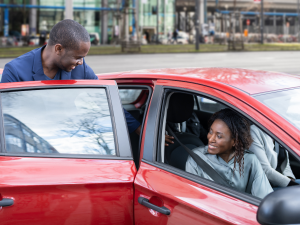 Carpooling or car sharing is a great way to reduce your carbon footprint and save money on gas and parking. By sharing a ride to Carleton University, you can help keep cars off the road and reduce traffic congestion.
Carpooling or car sharing is a great way to reduce your carbon footprint and save money on gas and parking. By sharing a ride to Carleton University, you can help keep cars off the road and reduce traffic congestion.
Cutting just 25 miles a week from your driving (which may be just 2 trips to and from campus) can save 1,500 pounds of carbon dioxide a year!
Carleton University offers flexible parking permit options for those who want to organize a carpool group. Parking permits can be shared among several vehicles as long as all vehicles are registered under the permit holder’s profile. Please note that only one vehicle may be parked on campus at any given time, and the same permit must be shared between vehicles. Contact Parking Services for more information on carpool parking permits.
OttawaRideMatch
Want to start carpooling but don’t know anyone to carpool with?
Register for ride-matching within the City of Ottawa area at OttawaRideMatch.com.
When you register with this carpooling service, your free membership will provide you with the following transportation options and benefits:
- Quickly and easily find people to carpool with – FREE to use – and available to anyone who lives/works in the National Capital Region.
- Add your own listings and/or reply to other listings.
- Easy to sign-up with your email address or download the app.
- Communicate using anonymous messaging to other members.
- Receive safe travel suggestions.
Carleton University is providing the above information as an option and accepts no liability whatsoever for any issues arising from sharing rides.
Car Sharing
 Parking Services has teamed up with Communauto and Zipcar to offer car-sharing services on campus.
Parking Services has teamed up with Communauto and Zipcar to offer car-sharing services on campus.
Car-sharing allows users to rent a vehicle from a fleet of cars on an hourly basis. Reserving a car is simple, with members being able to book a vehicle through an online platform or by phone, selecting the nearest available car and driving away.
The car-sharing vehicles are conveniently located in two areas on campus:
Communauto – Lot P4
Zipcar – P18 Garage on Level 2
In case the on-campus car-sharing inventory doesn’t meet your needs, there are additional pods of vehicles available nearby.
To learn more about these programs, please visit their websites at Communauto and Zipcar.
Other Ways You Can Help
Use video conferences rather than business trips whenever possible
Before traveling, ask yourself if it is truly necessary or if your goals can be achieved through a teleconference. This simple step can significantly decrease the amount of emissions produced by transportation.
Combine errands to reduce the need for unnecessary travel
Combining errands is a simple and effective way to use your vehicle more efficiently, reduce mileage, save on gas expenses, and minimize pollution. Here are some tips to help you combine your errands:
- Before driving to run an errand, ask yourself if it’s possible to walk or bike instead.
- Try to carpool with friends or family members to run errands together.
- If you drive to and from campus, use one of your trips to run errands and avoid making an additional trip later.
